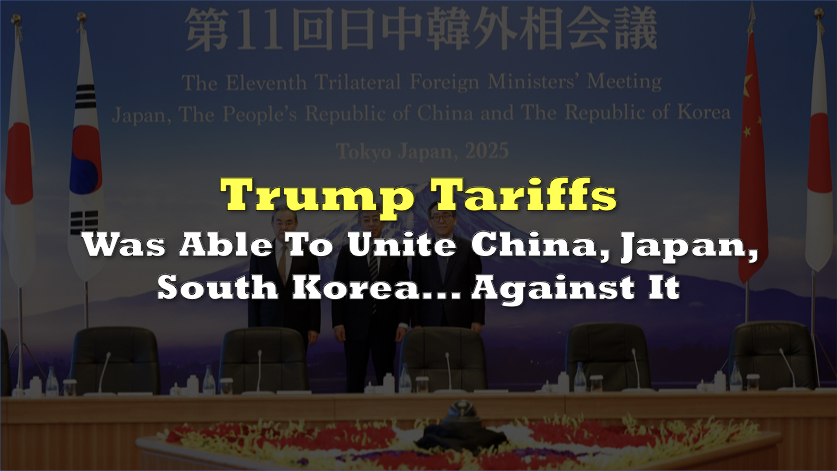Japan’s stock market is reeling from an unprecedented collapse, with the benchmark Nikkei 225 index experiencing its worst two-day decline in history. The market meltdown has sparked widespread concern among investors globally, reflecting deep-seated fears of a potential recession in the United States, the world’s largest economy.
Biggest 2-day drop for the Nikkei in history, surpassing Black Monday https://t.co/xh4zeBWS9C pic.twitter.com/4DESv6cpBx
— zerohedge (@zerohedge) August 5, 2024
Cascade of concerns
The market turmoil began last Friday when a report indicated that hiring by U.S. employers had slowed more than anticipated. This triggered a domino effect, vanquishing the euphoria that had recently driven the Nikkei 225 to record highs of over 42,000 points.
The concerns over the U.S. economy have been exacerbated by the Federal Reserve’s prolonged period of high-interest rates, which many fear might lead to a recession.
Jerome Powell, the Federal Reserve Chair, had hinted at possible rate cuts in September, initially boosting market optimism. However, Friday’s disappointing jobs data shifted sentiment, raising doubts about the Fed’s ability to stimulate the economy effectively.
On Monday, the Nikkei 225 plunged as much as 12.4%, closing at 31,458.42 points, a loss of 4,451.28 points. This followed a 5.8% drop on Friday, marking the worst two-day performance ever recorded for the index.
The broader Topix index also saw a significant decline, falling 12.23% to close at 2,227.15. This marks the worst day for the Topix since March 2020.

Heavyweight trading houses such as Mitsubishi, Mitsui & Co, Sumitomo, and Marubeni saw their shares plummet by over 14%, with Mitsui losing nearly 20% of its market cap. The yen strengthened to its highest level against the dollar since January, trading at 142.09 yen per U.S. dollar.
Shares of Mitsubishi UFJ Financial Group (MUFG), Japan’s largest bank, plunged over 21% on Monday. This is the biggest drop in the bank’s history, further compounding the financial sector’s woes amid the broader market turmoil.
Neil Newman, head of strategy at Astris Advisory in Tokyo, likened the situation to the infamous “Black Monday” of 1987, stating, “That was a crash. It smelled like 1987.” This comparison highlights the severity of the current market conditions.
BREAKING: SHARES OF JAPAN’S LARGEST BANK MUFG ARE DOWN OVER 21% TODAY
— GURGAVIN (@gurgavin) August 5, 2024
THIS IS THE BIGGEST DROP EVER IN ITS HISTORY pic.twitter.com/Zvz7l6tSUS
Global ripple
The panic in Japan’s stock market has reverberated across global markets. South Korea’s Kospi index fell 8.77%, closing at 2,441.55, while the smaller Kosdaq saw an 11.3% decline. Taiwan’s Taiex dropped 8.4%, its worst single-day performance ever, with Taiwan Semiconductor Manufacturing Co. shares falling 9.8%.
In Australia, the S&P/ASX 200 fell 3.7% to 7,649.60. Hong Kong’s Hang Seng Index and China’s Shanghai Composite fell 2.3% and 1.3%, respectively. European markets opened significantly lower on Monday, with Germany’s DAX down 2.3%, France’s CAC 40 losing 1.9%, and London’s FTSE 100 falling 2.1%.
The global market volatility was further exacerbated by heightened geopolitical tensions and weak economic data from China, where the purchasing managers’ index (PMI) for manufacturing fell to 49.2 in July, indicating contraction.
A critical factor in the sell-off has been the unwinding of the yen carry trade. This strategy involves borrowing yen at low-interest rates to invest in higher-yielding assets abroad. With the BOJ raising interest rates and the yen strengthening, the profitability of this trade has diminished, leading investors to sell off their assets and repay their loans, further depressing asset prices.
Michael Farris, an investor, explained this phenomenon on X: “Over the years, trillions of yen have been borrowed and converted to other currencies to buy assets like stocks and bonds. But now Japanese interest rates are rising and the yen is strengthening against the dollar, making this ‘Yen Carry Trade’ much less profitable. So people are selling the assets they bought, converting back to yen, and paying off the loans.”
Over the years trillions of Yen have been borrowed and converted to other currencies to buy assets like stocks and bonds. The cheap Japanese interest rates and weakening yen have made this trade very profitable. But now Japanese interest rates are rising and the yen is…
— Nobody Special (@JG_Nuke) August 5, 2024
Industry hits
The technology sector has also been hit hard. Stocks that had previously surged on the hype around artificial intelligence have faced significant corrections. Companies like Amazon and Intel reported mixed earnings, further dampening investor sentiment. Amazon missed earnings expectations for the second quarter and provided disappointing guidance for the third quarter. Intel reported a $1.6 billion loss for the second quarter and announced plans to reduce its workforce by 15%.
Stephen Innes, managing partner of SPI Asset Management, highlighted the widespread anxiety: “The buzz is all about the contagion effect of this aggressive bear onslaught, underscored by fears of a hard landing in the US and a severe meltdown in Tokyo’s markets, which now appear to be self-perpetuating.”
The market downturn is occurring amidst a complex global economic backdrop. The Federal Reserve’s high-interest rates aim to curb inflation, but they also risk slowing down economic growth. The BOJ’s recent rate hikes are part of a broader effort to contain inflation, but they have contributed to the yen’s appreciation, making Japanese exports more expensive and less competitive.
In China, economic data continues to point to a slowdown. The official manufacturing PMI fell in July, indicating ongoing weakness in factory activity. This adds to concerns about global economic stability, given China’s significant role in global trade.
The volatility has not spared the cryptocurrency and oil markets. Bitcoin, which had recently surged to nearly $70,000, dropped by 16% to $53,160. This decline is part of a broader sell-off in digital assets, reflecting investor risk aversion.
Cryptocurrency markets are currently crashing. Large increases and decreases are common for crypto, but this is sector wide. https://t.co/g14Le1QAqr pic.twitter.com/8D6Ds7PVNM
— OSINT Aggregator (@AggregateOsint) August 5, 2024
Oil prices have also been affected, with U.S. benchmark crude oil falling 74 cents to $72.78 per barrel, and Brent crude, the international standard, dropping 67 cents to $76.14 per barrel. Tom Kloza, global head of energy analysis at Oil Price Information Service, commented, “Beginning with the Hamas action last October 7, we are seeing mostly apathy when it comes to fears about a wider regional war in the Middle East.”
市場を閉鎖する!!! https://t.co/HFGipxHzkI pic.twitter.com/Hb9Na6EvLO
— Ramp Capital (@RampCapitalLLC) August 5, 2024
The mood among investors is decidedly dark. The VIX index, which measures market volatility, rose by about 26% early Monday, indicating heightened anxiety about future market drops. CNN’s Fear and Greed index, a gauge of market sentiment, has fallen to a “fear” reading of 27.
Information for this briefing was found via AP, CNN, CNBC, and the sources mentioned. The author has no securities or affiliations related to the organizations discussed. Not a recommendation to buy or sell. Always do additional research and consult a professional before purchasing a security. The author holds no licenses.









